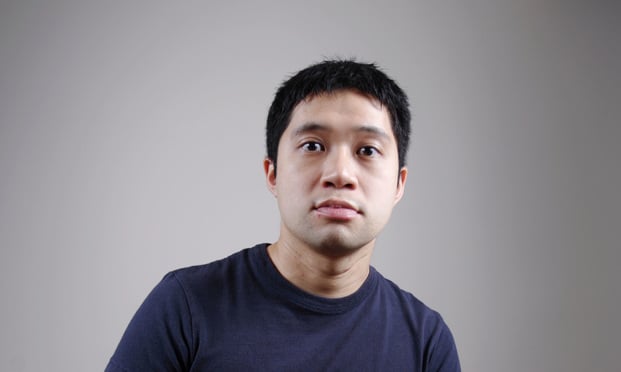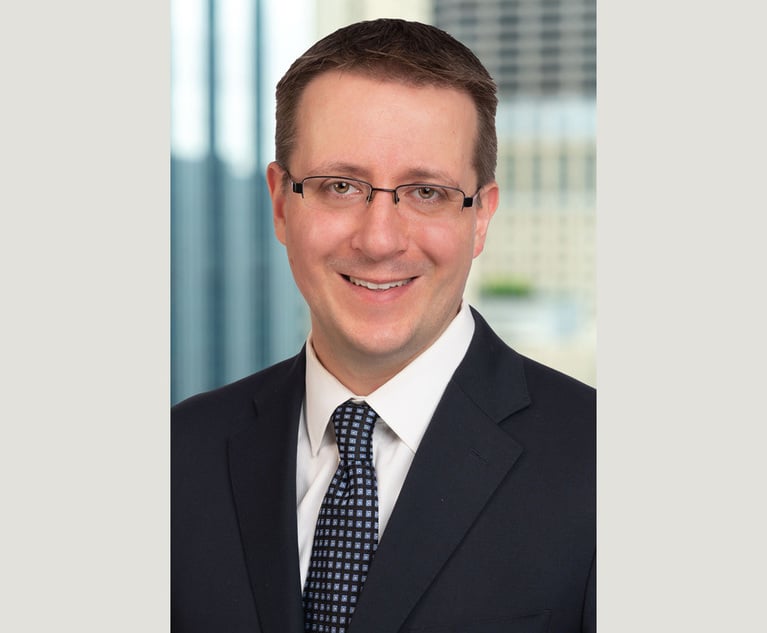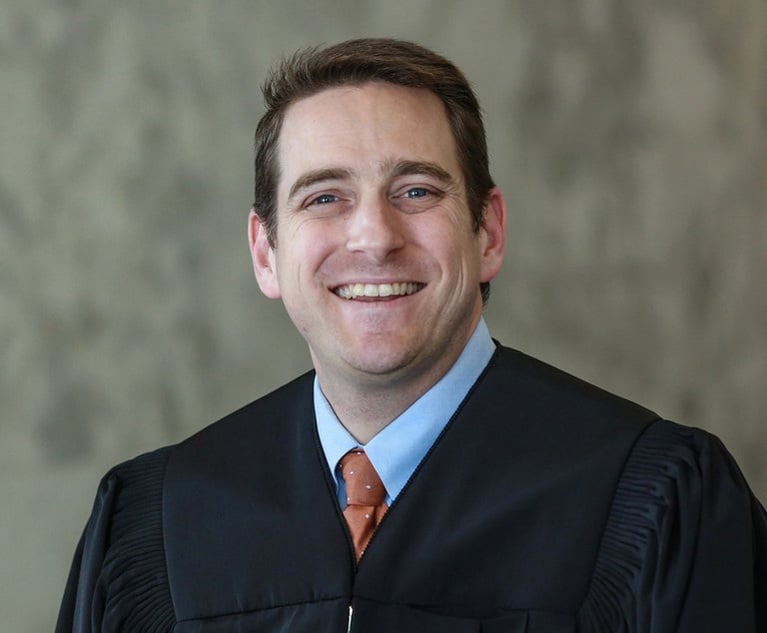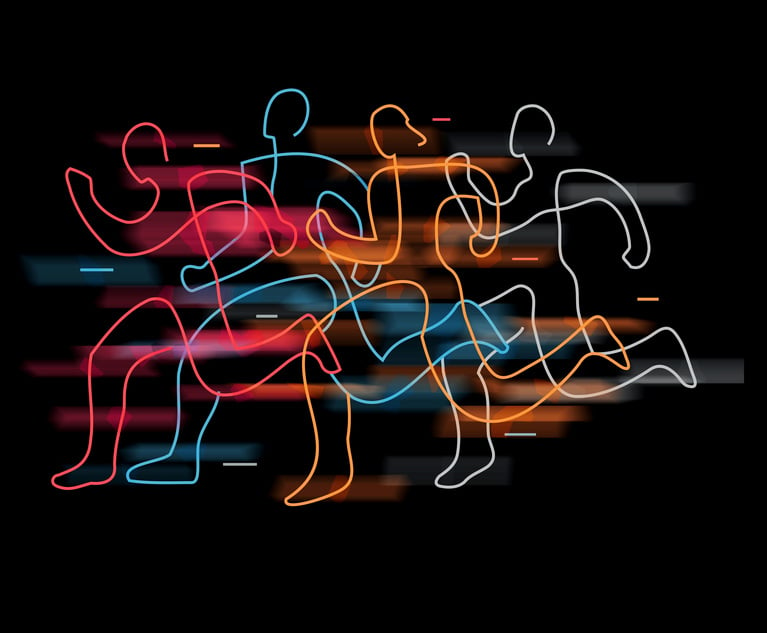'Mild Improvements' for David Lat, but Prognosis Remains Uncertain
"There have been mild improvements in his oxygen and his breathing, but he remains intubated and we are still very far from out of the woods," said Zachary Baron Shemtob, Lat's husband, in an interview Thursday.
March 26, 2020 at 07:49 PM
6 minute read
The original version of this story was published on New York Law Journal
 David Lat. Photo: Diego M. Radzinschi/ALM
David Lat. Photo: Diego M. Radzinschi/ALM
David Lat's breathing capacity and oxygen levels have increased mildly, which are positive signs as he fights the novel coronavirus, but he remains in intensive care and on a ventilator. And his doctors still do not know whether he will pull through, said Lat's husband late Thursday afternoon.
"There have been mild improvements in his oxygen and his breathing, but he remains intubated, and we are still very far from out of the woods," said Zachary Baron Shemtob, Lat's husband, in a phone interview.
"I just want to stress that these improvements are modest, and that we are still waiting," he said. "We remain hopeful."
Shemtob added that in recent days, the physicians at NYU Langone Hospital who are treating Lat, the founder of the legal blog Above the Law, have stopped administering to Lat the novel drug therapies that they began giving to him last Saturday, after he was forced into intensive care because of falling oxygen levels.
After Lat was moved to the ICU, intubated and put on a ventilator, his doctors began giving him both a Z-Pak (azithromycin) and the antimalarial drug hydroxychloroquine in an effort to knock down his COVID-19 infection, Shemtob has said. They also started administering an IL 6-inhibitor to help fight the extreme inflammation of Lat's lungs caused by the virus.
By about Monday, after what Shemtob believes was two IL 6-inhibitor treatments, the physicians decided not to give him more, at least for now, said Shemtob. By Wednesday, they stopped the Z-Pak (azithromycin) and hydroxychloroquine therapy.
"They are no longer giving him the drugs, even though they may still be in his system," said Shemtob, who has a 2-year-old son with Lat. "I think they're [the doctors] just looking to see if and how he improves before taking their next steps."
Shemtob said that what the next steps in treatment may be is unclear. Depending on how Lat, 44, does in the next few days, the doctors could return to using the same drug therapies or perhaps try, or add on, another treatment.
"Just because this [coronavirus] is so new," said Shemtob, "the doctors are taking it day by day," and they haven't tried to predict what may come next as far as treatments, or how Lat will do.
"There is no timeline" for Lat's hoped-for progress, he added, because "there's not a lot of good comparator" cases.
Shemtob, a former clerk for Judge Robert Sack of the U.S. Court of Appeals for the Second Circuit and a former associate at Cooley, has said that the drug therapies being used on Lat, in his view, are experimental.
"These drugs have been around a while," he said Thursday, "but they are experimental in the sense that they are now starting to be used for this," the novel coronavirus.
A small, recent study from France has indicated using a Z-pak and hydroxychloroquine may help people fight off a COVID-19 infection. But experts have cautioned that the French study was too small to know about the true safety and efficacy of using the drug therapy. Hydroxychloroquine is a derivative of chloroquine, which was discovered in 1934 and used on malaria patients.
Shemtob, 36, said Thursday that he tries to get a hold of and speak each day by phone with a physician assistant or an attending nurse working on Lat's case.
He also noted that he hasn't been able to communicate with Lat, who remains mostly sedated, since Lat was put on the ventilator late March 20 or early March 21.
One of the toughest parts of Lat's illness, he has said, is that he and Lat's other family are not allowed to visit Lat at the hospital because of the contagious virus.
For now, Lat and Shemtob's son has been staying with Lat's parents in northern New Jersey, he said on Thursday, since he also has contracted the coronavirus, presumably from his previous contact with Lat,. But he believes the virus has nearly or fully run its course in him. And other than flu-like symptoms, he has been OK.
Lat, who today is a widely recognized legal recruiter and speaker, has been hospitalized at NYU Langone in Manhattan since March 16. For more than a week before being admitted to the hospital, he had experienced intermittent fevers, joint aches, chills, fatigue and coughing. Labored breathing set in by March 15, forcing him to go to his nearest emergency room to seek a coronavirus test.
In a March 18 phone interview from his hospital bed, Lat said that he's generally been a very healthy person but did note that he has exercise-induced asthma.
On Thursday, Shemtob spoke about being grateful for a huge outpouring of support for Lat, as he fights for his life, that has come from around the legal field and from many others across the world. Stories about Lat's battle have grabbed hundreds of thousands of readers, and Tweets sent out by those who know him, and those who don't, have been emotional and hopeful—and themselves have been read by many.
"Couldn't sleep last night thinking about him, many prayers sent," said a Twitter user called "Remember Truth n' Justice?" on March 22 in a comment underneath a Tweet out of a recent Lat story.
Another Twitter user said that Lat's case, for him, means the end of any debate about whether the virus can be harmful to adults who aren't elderly and who don't have serious underlying conditions.
Shemtob also has used the coverage of Lat's fight to spread the word that the virus must be taken seriously by anyone, of any age, and that they should shelter in and not cause risk to themselves or others.
"I've been told that people appreciate the seriousness of this as seen through David," he said. "People we don't even know."
Then, he said of he and the Lat family's reaction to his husband's improved breathing over the last day or so, "We remain hopeful, but we're still very cautious. David remains seriously ill."
This content has been archived. It is available through our partners, LexisNexis® and Bloomberg Law.
To view this content, please continue to their sites.
Not a Lexis Subscriber?
Subscribe Now
Not a Bloomberg Law Subscriber?
Subscribe Now
NOT FOR REPRINT
© 2025 ALM Global, LLC, All Rights Reserved. Request academic re-use from www.copyright.com. All other uses, submit a request to [email protected]. For more information visit Asset & Logo Licensing.
You Might Like
View All
How the Court of Public Opinion Should Factor Into Litigation Strategy

An Eye on ‘De-Risking’: Chewing on Hot Topics in Litigation Funding With Jeffery Lula of GLS Capital
Law Firms Mentioned
Trending Stories
Who Got The Work
J. Brugh Lower of Gibbons has entered an appearance for industrial equipment supplier Devco Corporation in a pending trademark infringement lawsuit. The suit, accusing the defendant of selling knock-off Graco products, was filed Dec. 18 in New Jersey District Court by Rivkin Radler on behalf of Graco Inc. and Graco Minnesota. The case, assigned to U.S. District Judge Zahid N. Quraishi, is 3:24-cv-11294, Graco Inc. et al v. Devco Corporation.
Who Got The Work
Rebecca Maller-Stein and Kent A. Yalowitz of Arnold & Porter Kaye Scholer have entered their appearances for Hanaco Venture Capital and its executives, Lior Prosor and David Frankel, in a pending securities lawsuit. The action, filed on Dec. 24 in New York Southern District Court by Zell, Aron & Co. on behalf of Goldeneye Advisors, accuses the defendants of negligently and fraudulently managing the plaintiff's $1 million investment. The case, assigned to U.S. District Judge Vernon S. Broderick, is 1:24-cv-09918, Goldeneye Advisors, LLC v. Hanaco Venture Capital, Ltd. et al.
Who Got The Work
Attorneys from A&O Shearman has stepped in as defense counsel for Toronto-Dominion Bank and other defendants in a pending securities class action. The suit, filed Dec. 11 in New York Southern District Court by Bleichmar Fonti & Auld, accuses the defendants of concealing the bank's 'pervasive' deficiencies in regards to its compliance with the Bank Secrecy Act and the quality of its anti-money laundering controls. The case, assigned to U.S. District Judge Arun Subramanian, is 1:24-cv-09445, Gonzalez v. The Toronto-Dominion Bank et al.
Who Got The Work
Crown Castle International, a Pennsylvania company providing shared communications infrastructure, has turned to Luke D. Wolf of Gordon Rees Scully Mansukhani to fend off a pending breach-of-contract lawsuit. The court action, filed Nov. 25 in Michigan Eastern District Court by Hooper Hathaway PC on behalf of The Town Residences LLC, accuses Crown Castle of failing to transfer approximately $30,000 in utility payments from T-Mobile in breach of a roof-top lease and assignment agreement. The case, assigned to U.S. District Judge Susan K. Declercq, is 2:24-cv-13131, The Town Residences LLC v. T-Mobile US, Inc. et al.
Who Got The Work
Wilfred P. Coronato and Daniel M. Schwartz of McCarter & English have stepped in as defense counsel to Electrolux Home Products Inc. in a pending product liability lawsuit. The court action, filed Nov. 26 in New York Eastern District Court by Poulos Lopiccolo PC and Nagel Rice LLP on behalf of David Stern, alleges that the defendant's refrigerators’ drawers and shelving repeatedly break and fall apart within months after purchase. The case, assigned to U.S. District Judge Joan M. Azrack, is 2:24-cv-08204, Stern v. Electrolux Home Products, Inc.
Featured Firms
Law Offices of Gary Martin Hays & Associates, P.C.
(470) 294-1674
Law Offices of Mark E. Salomone
(857) 444-6468
Smith & Hassler
(713) 739-1250








